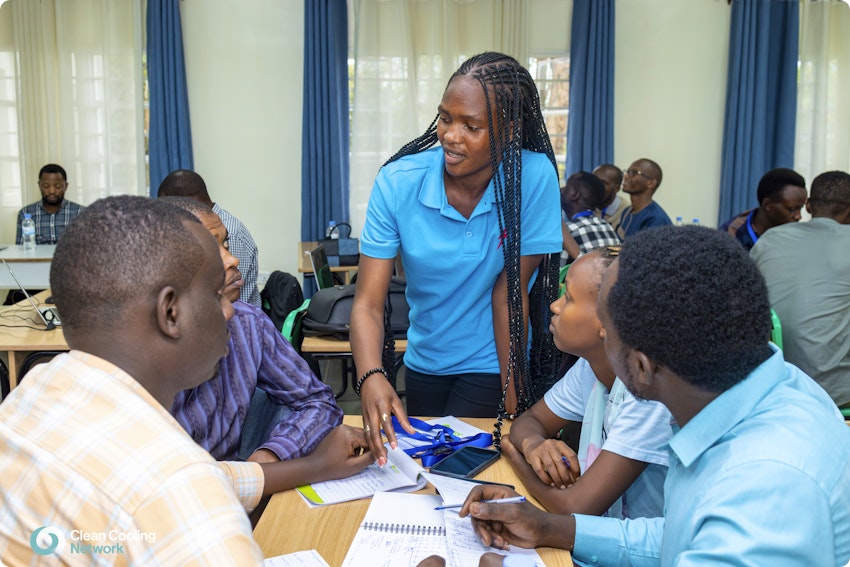ACES and Clean Cooling Network’s Train the Trainer Programme secured accreditation

Kigali, 24th October 2025 - The Institution of Agricultural Engineers (IAgrE) has formally accredited the Train the Trainer Programme delivered by the Africa Centre of Excellence for Sustainable Cooling and Cold-Chain (ACES) and the Clean Cooling Network (CCN) at the ACES campus in Kigali.
This recognition confirms that the programme now offers students a Postgraduate Certificate (PGCert) in Train the Trainer – Clean Cooling and a Master of Science (MSc) in Clean Cooling, marking a significant step forward in professionalising the global clean cooling and cold-chain workforce.
The accreditation recognises the high academic and professional standards of the programme and its alignment with IAgrE’s mission to promote engineering excellence, innovation, and sustainability in agriculture, the environment, and food systems.
With this approval, the following qualifications are now formally recognised:
- Postgraduate Certificate (1 year): PGCert Train the Trainer – Clean Cooling
Master of Science (2 years): MSc in Clean Cooling, with three specialisation streams:
- Sustainable Cooling
- Cold-Chain for Postharvest Management and Value Addition
- Cold-Chain and Business Models
The deep-dive TtT course provides community leaders and mobilisers with comprehensive knowledge in refrigeration, cold-chain applications, cooling hub design, and the essential business models for food and pharma. It includes 10 x 1-week modules; at the end of the course, successful candidates will receive a PGCert. The programme can be extended by one year for students who wish to gain specialised knowledge in specific fields in relation to the sustainable cold-chain. At the end of which they will be awarded an MSc.
Building Capacity for Climate-Resilient Development
Globally, an estimated 526 million tonnes of food is lost each year due to the absence of effective cold-chains, equivalent to nearly 12% of all food produced for human consumption. In Africa, this challenge is particularly critical, where 30–50% of perishable produce is lost post-harvest, contributing to food insecurity, economic losses, and avoidable greenhouse gas emissions.
By equipping engineers, technicians, and trainers with world-class skills and credentials, this programme helps transform these statistics into opportunities, empowering communities to design and maintain efficient, low-carbon cold-chains that protect food, health, and livelihoods.
Charles Nicklin CEng FIAgrE, Chief Executive Officer of the Institution of Agricultural Engineers, said: "We recognise the high standards applied to your programme and the alignment with our core professional and educational values. We look forward to our continued collaboration in maintaining the quality and relevance of professional training provision."
A Global Model for Professionalising Clean Cooling
The IAgrE endorsement signifies a milestone not only for ACES and CCN but also for the broader international effort to develop the next generation of clean cooling professionals. The Train the Trainer pathway provides several module learning structures covering refrigeration technology, postharvest management, telemetry and data logging, gender inclusion, sustainable finance, and policy leadership.
Professor Toby Peters, the Founding Director of ACES and Co-Founder of the Clean Cooling Network, said: "This is a moment of genuine significance, for our programme, for the communities we serve, and for the growing global network working to make cooling a critical infrastructure for climate resilience.
To move from our first pilot course to full accreditation at PGCert and MSc levels reflects the collective rigour, innovation, and shared vision that underpin our mission. This endorsement strengthens our commitment to creating a recognised professional pathway, one that connects evidence, education, and empowerment to build a workforce ready for a sustainable cooling future."
The courses were developed through an academic partnership led by the University of Birmingham, Cranfield and London South Bank Universities with funding from the Department for Environment, Food & Rural Affairs (Defra). Defra is investing more than £25M into the programme to accelerate the delivery of sustainable, resilient and equitable cooling and cold-chains in the developing countries of the world, harnessing them to improve food security and resilience, social, One Health, environmental, and economic goals - locally and globally.
With over 3,000 members worldwide, IAgrE’s endorsement provides international recognition for the programme and reinforces ACES's and CCN’s growing institutional foundation for future partnerships, accreditations, and research collaborations.
About the Institution of Agricultural Engineers (IAgrE)
Founded in 1938, IAgrE is the UK’s professional body for engineers, scientists, and technologists working in agriculture, the environment, and agri-tech industries. The Institution promotes the application of engineering and scientific principles to enhance productivity, sustainability, and innovation across global food and environmental systems.
